外研版 英语必修四 Module 6 Unexplained Mysteries of the Nature World 情态虚拟课件(共92张)
文档属性
| 名称 | 外研版 英语必修四 Module 6 Unexplained Mysteries of the Nature World 情态虚拟课件(共92张) |  | |
| 格式 | zip | ||
| 文件大小 | 379.0KB | ||
| 资源类型 | 教案 | ||
| 版本资源 | 外研版 | ||
| 科目 | 英语 | ||
| 更新时间 | 2019-06-21 06:55:38 | ||
图片预览


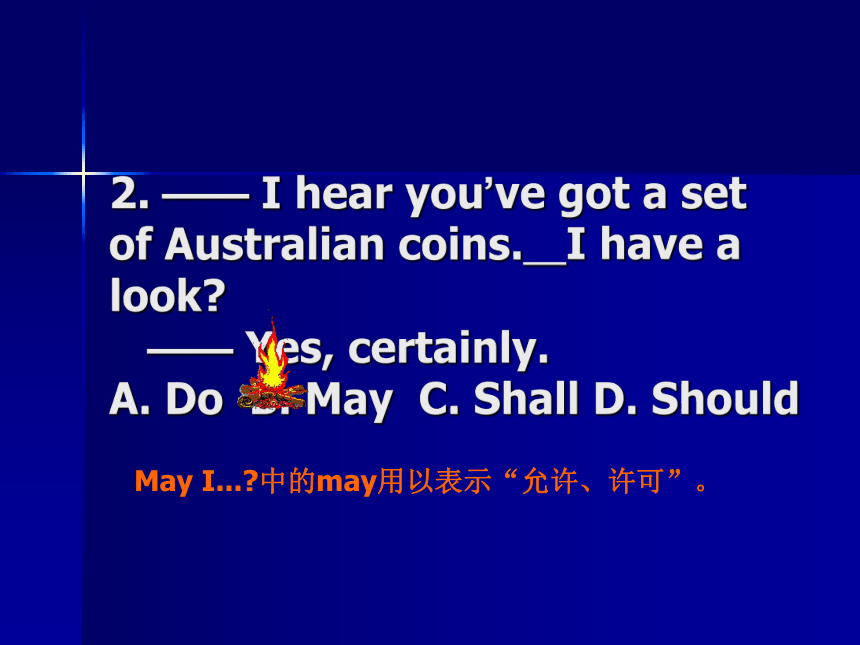
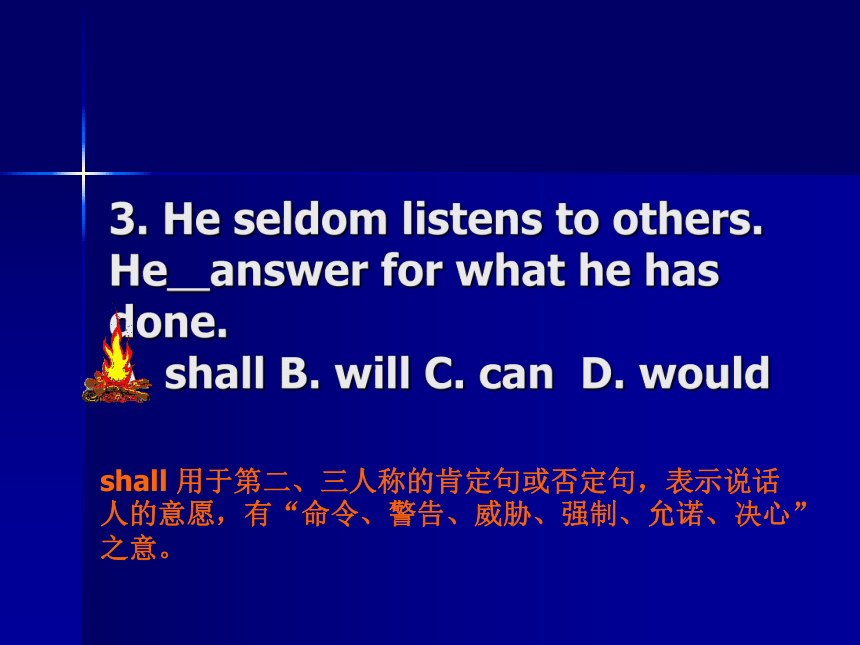
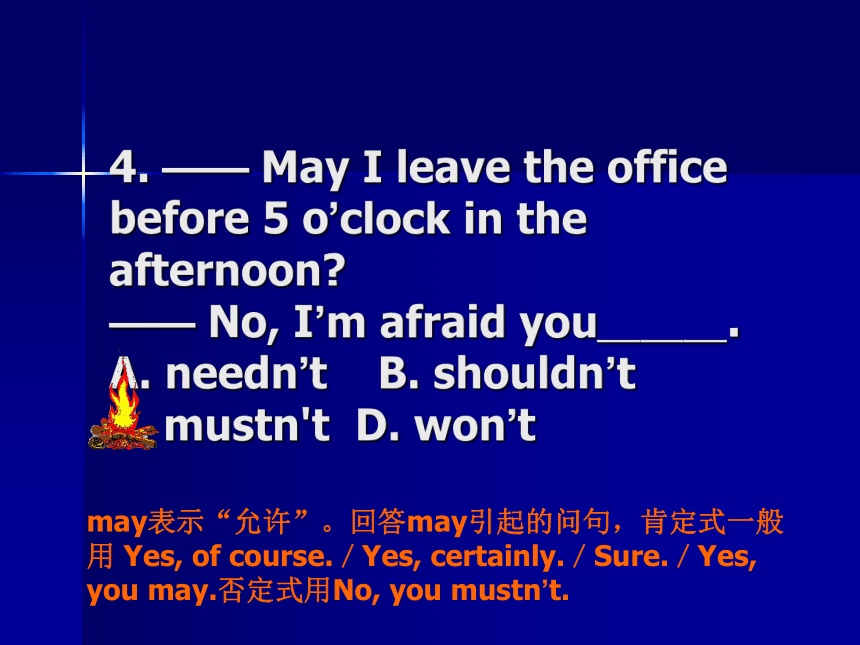
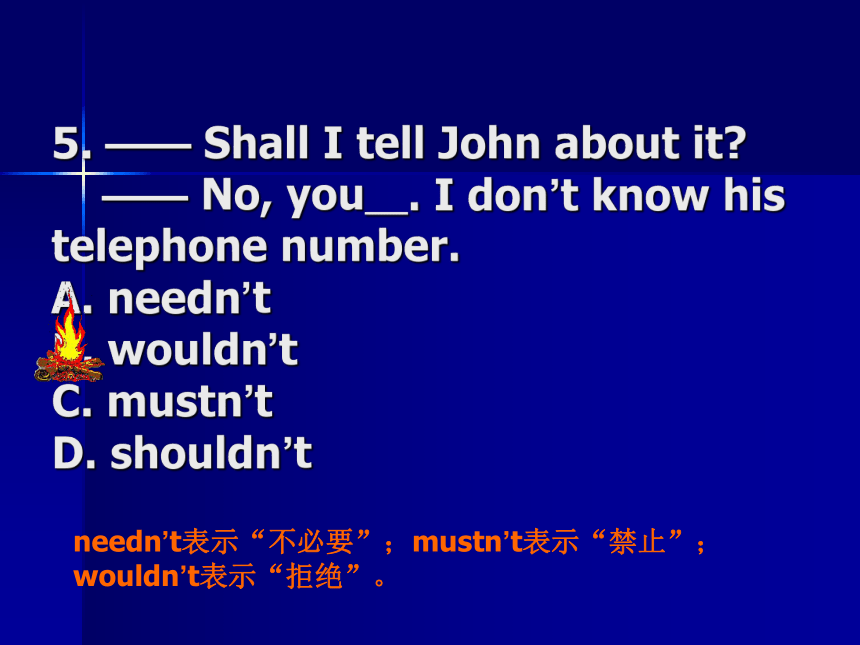
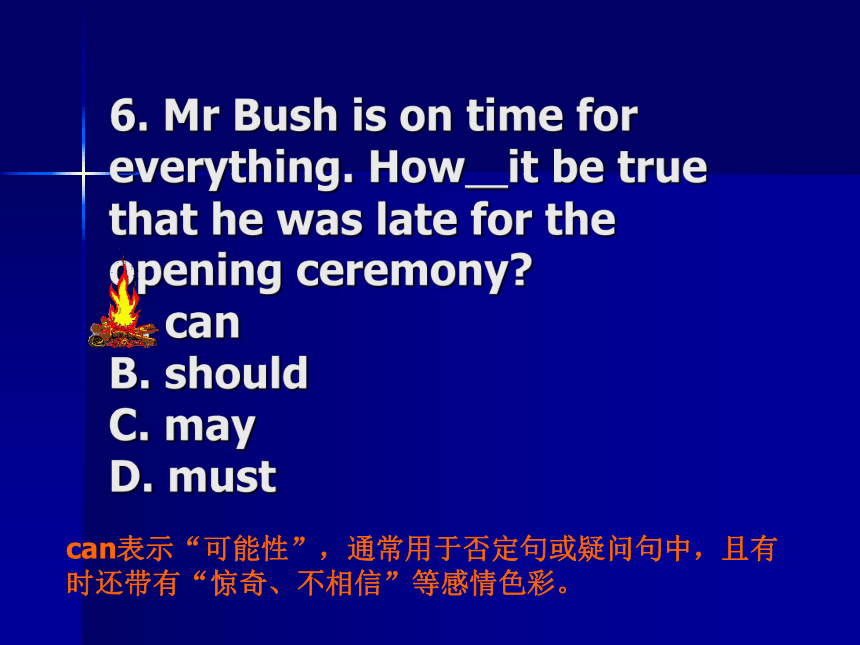
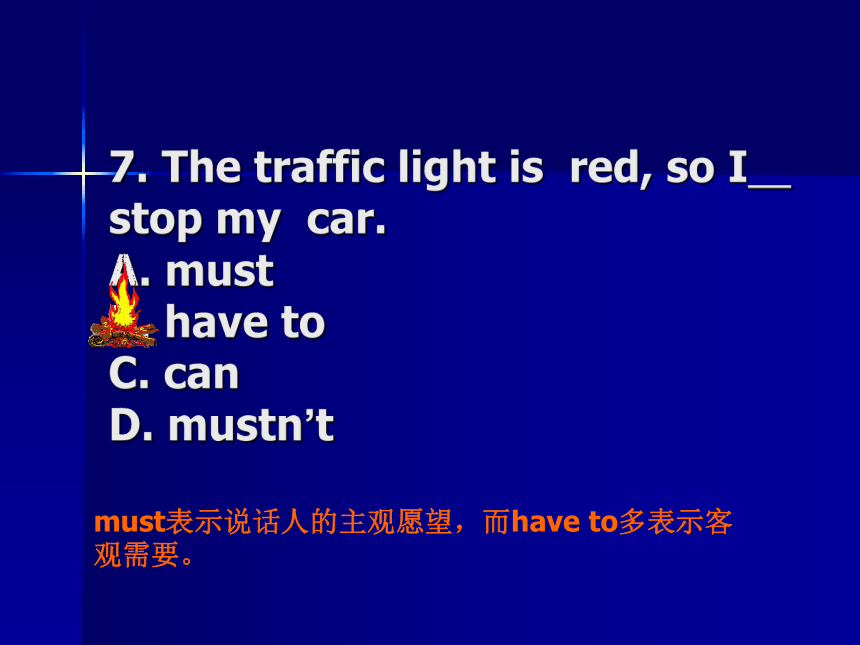
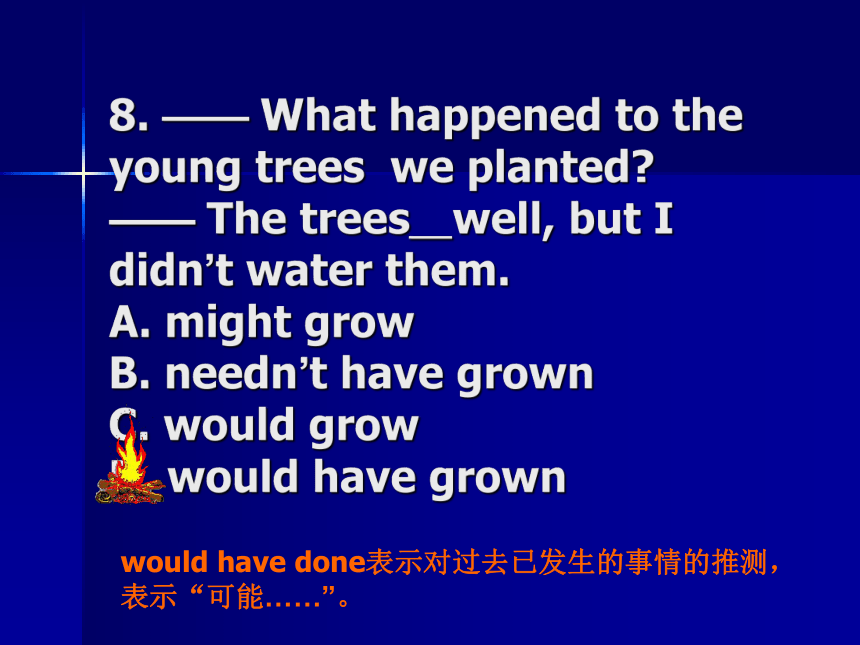

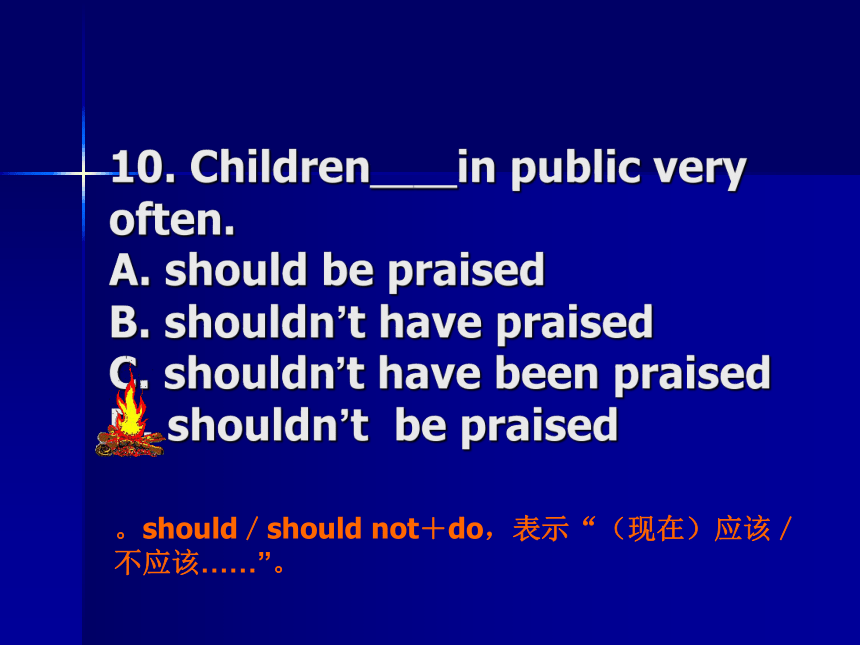
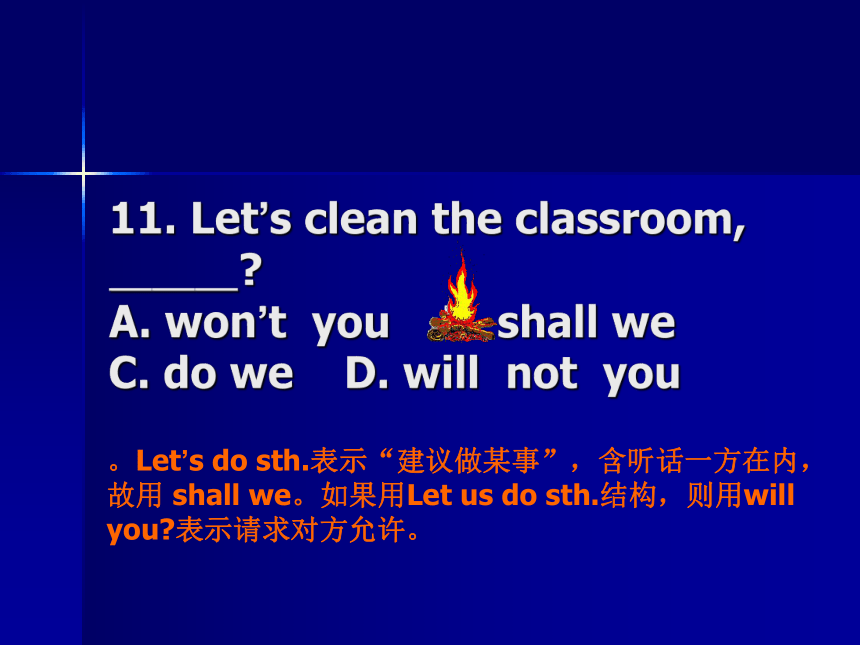
文档简介
课件92张PPT。中学英语语法分类总复习四 情态动词虚拟语气专练90题1. —— Don’t forget to bring my new books tomorrow afternoon.
—— No, I_______. A. don’t B. can’t C. won’t D. couldn’t will在此表示“应诺”。 2. —— I hear you’ve got a set of Australian coins._I have a look? —— Yes, certainly. A. Do B. May C. Shall D. ShouldMay I...?中的may用以表示“允许、许可”。 3. He seldom listens to others. He_answer for what he has done. A. shall B. will C. can D. wouldshall 用于第二、三人称的肯定句或否定句,表示说话人的意愿,有“命令、警告、威胁、强制、允诺、决心”之意。4. —— May I leave the office before 5 o’clock in the afternoon? —— No, I’m afraid you___. A. needn’t B. shouldn’t C. mustn't D. won’tmay表示“允许”。回答may引起的问句,肯定式一般用 Yes, of course./Yes, certainly./Sure./Yes, you may.否定式用No, you mustn’t. 5. —— Shall I tell John about it? —— No, you_. I don’t know his telephone number. A. needn’t B. wouldn’t C. mustn’t D. shouldn’tneedn’t表示“不必要”;mustn’t表示“禁止”;wouldn’t表示“拒绝”。6. Mr Bush is on time for everything. How_it be true that he was late for the opening ceremony? A. can B. should C. may D. mustcan表示“可能性”,通常用于否定句或疑问句中,且有时还带有“惊奇、不相信”等感彩。 7. The traffic light is red, so I_stop my car. A. must B. have to C. can D. mustn’t must表示说话人的主观愿望,而have to多表示客观需要。8. —— What happened to the young trees we planted?
—— The trees_well, but I didn’t water them.
A. might grow B. needn’t have grown C. would grow D. would have grownwould have done表示对过去已发生的事情的推测,表示“可能……”。 9. I was really anxious about you. You___home without a word. A. mustn’t leave B. shouldn’t have left C. couldn’t have left D. needn’t leaveshouldn’t have done表示“过去本来不应该做某事而事实上已经做了”。 10. Children__in public very often. A. should be praised B. shouldn’t have praised C. shouldn’t have been praised D. shouldn’t be praised。should/should not+do,表示“(现在)应该/不应该……”。 11. Let’s clean the classroom, ___? A. won’t you B. shall we C. do we D. will not you。Let’s do sth.表示“建议做某事”,含听话一方在内,故用 shall we。如果用Let us do sth.结构,则用will you?表示请求对方允许。12. Tom_show his exam results to his parents. A. dare not B. dared C. dare to D. dares not to情态动词dare的过去式为dared,常用于否定句、疑问句及条件句中,没有人称和数的变化,否定式是在dare后接not,再接动词原形。dare作为实义动词时,有人称和数的变化,构成否定句时,前要加助动词,后接带to或不带to的动词不定式。 13. I don’t think he_ a new bike. A. need to buy B. needs buy C. need D. need buyneed作为情态动词,一般用于否定句、疑问句及条件句中,后接动词原形。表示“现在不必干某事”,用need not do sth.;表示“过去不必干某事”,用need not have done。need作为实义动词,与其它动词用法相同,用于否定句或疑问句要加助动词。 14. —— Nancy_ the letter from her mother. —— No, she can’t have. The postman hasn’t come yet. A. can receive B. can have received C. must have received D. must receive“must have done”结构,表示对过去发生情况的肯定推测。15. She_the film. She knows nothing about it. A. can’t see B. can’t have seen C. must see D. mustn’t have seencan’t have done,表示对过去发生情况的否定推测,意为“不可能已经……”。 16. They must have been here the day before yesterday,_?
A. mustn’t they B. didn’t they C. mustn’t have they D. had they。must have done表示对过去发生情况的肯定推测,句中带有明确的过去时间状语,故附加疑问句用“didn’t they”。 17. —— I didn’t see her yesterday. —— Oh, but you __. A. must have B. ought to C. should have D. cannot haveshould/ought to have done表示“本来应该做的事而事实上并未做”。根据上下文,句中省去了seen her。18. —— Must I take a bus ? —— No, you_. You can walk from here. A. must not B. don’t C. don’t have to D. had better not to回答must引起的问句,否定回答用needn’t或don’t have to. 19. —— Why do you make me do so? —— I am sorry that you__do such a thing. A. would B. can C. should D. mayI’m sorry/surprised/disappointed之后的从句中,有时采用虚拟语气should do来表示“难过、惊奇”等情绪。20. —— Will you stay for lunch? —— Sorry, _. My brother is coming to see me. A. I mustn’t B. I can’t C. I needn’t D. I won’t“Will you...?”在此表示邀请或请求,回答时如果用 I won’t 显得极不礼貌,也不符合下文; My brother is... me.表示“我不能来的原因”。21. What would have happened__, as far as the river bank? A. if Bob has walked farther B. if Bob should walk farther C. had Bob walked farther D. if Bob walked farther此题表示与过去事实相反的假设,主句用would have done,从句用had done,此处用了倒装的省略形式,即省去if, had提到句首。22. You didn’t let me drive. If we_in turn, you_ so tired. A. drove; didn't get B. drove; wouldn't get C. were driving; wouldn’t get D. had driven; wouldn’t have got此题表示与过去事实相反的假设,主句用would have done,从句用had done,23. Without electricity human life__quite different today. A. is B. will be C. would have been D. would be此题表示与现在事实相反的假设,主句用should/would/might/could+do. 24. Oh, Janna, you’ve broken another glass. You ought __when you washed it. A. be careful B. to care C. have cared D. to have been carefulshould/ought to have done表示“本来应该做的事而事实上并未做”。 25. I__often go fishing when I lived in the countryside. A. should B. would C. could D. mightwould在此表示过去的习惯、习性、倾向等,意为"常......",通常与often, sometimes ,for hours等表示时间的短语连用。 26. He_rather stay at home than go to the cinema with you. A. should B. might C. would D. had betterwould rather do sth. than do sth.为固定搭配,“宁愿做……而不愿做……”。 27. It’s high time we__ to the theater. A. will B. shall C. are going to D. wentIt’s(high/about) time that从句的谓语动词多用过去式,有时也可用should do。 28. —— Could I use your telephone? —— Yes, of course you ___. A. could B. will C. can D. mightCould I...?问句表示委婉的请求,若允许对方,应用can来作答,而不用could。29. It’s strange that they_nothing about this matter. A. know B. would know C. knows D. knew在It’s important/surprising/desirable/strange/necessary/no wonder/a pity/a shame+that 从句中,从句谓语动词用(should ) do。30. I wish you______go with me tomorrow. A. will B. would C. shall D. canwish后接从句,如果从句指将来的愿望,谓语动词用would/could+do;如果表示过去未能实现的愿望,从句谓语动词用had done;如果表示现在未能实现的愿望,从句的谓语动词用过去式,be动词用were。31. — Do you still remember the day when we went to the Great Wall? — I can’t remember it well, but_sometime last autumn? A. might it be B. could it have been C. could it be D. must it have been could have done表示对过去发生情况的可能性推测。32. —— I can’t get through to the general manager’s office anyhow. —— The line is busy. Someone_the telephone. A. must use B. uses C. must have been using D. must be using must be using表示此刻“一定正在使用……”。 33. He suggests we_to the cinema at once, otherwise we will be late. A .must go
B. go C. will go D. would go在suggest, demand, request,require(要求),order(命令),insist(坚持),advise(劝告)等动词之后的宾语从句中,谓语动词要用(should) do,同时还应注意语态。34. When a pencil is partly in a glass of water, it looks as if _. A. breaks B. has broken C. were broken D. had been brokenas if引导的从句,如果所说内容与事实不相符时,常用虚拟语气。此题是一种自然现象,故应用一般过去时。注意比较It seems/looks as if it is going to rain.(看起来天将要下雨。)35. The general ordered that the thief_ A. be punished B. would punish C. would be punished D. should punish 36. If only I_how to operate a computer as you do! A. had known B. would know C. should know D. knew在if only引导的感叹句中,谓语动词的形式与wish后宾语从句中谓语动词的形式一样。 37. It is surprising that he_at the meeting. A. was B. be C. is D. were38. If you____wait a moment, I’ll go and find our manager. A. can B. should C. will D. mustwill在此为情态动词,表示“意愿”。 39. —— Do you think he will do me a favor? —— As far as I know, he is the last one to help others. He ___ be prepared to give you a hand, though. A. might B. must C. can D. should 根据上下文可知句意为“他不愿意帮助别人,但也许他会帮你的忙”。用“might”,表示“可能性”比较小。40. Even though I’d hurt my leg, I_ swim back to the river bank.
A. could B. might C. had to D. was able tocan表示能力时可用be able to代替。但can只有一般时和过去时,be able to可用于各种时态。如果表示“过去有能力并成功地做成了某事"时,要用was/were able to,不用could。 41. You_go to the party if you don’t finish your homework first.
A. won’t B. don’t C. oughtn’t D. shan’t42. —— It is rather cold here. Shall we light a fire? —— No, we_because things are easy to catch fire. A. won’t B. can’t C. mustn’t D. needn’tmustn’t在此表示“禁止”。43. I_Professor Jones had taught me this question. A. believe B. deeply think C. wish D. suppose44. The chairman requested that ______. A. the members studied the problem more carefully B. the problems were more carefully studied C. the problems could be studied with more care D. the members study the problem more carefully45. I__it again.
A. would like you to read B. would like that you read C. would like you reading D. would like you readwould like sb. to do sth.意为“想要某人做某事”。为固定搭配。46. If you really want yourself to be in good health, you must___always___so much. A. not; be smoking B. not; have smoked C. not; to smoke D. be not; smokingmustn’t be doing与always连用,表示“一定不要总是在做……”,含有“埋怨、不满”等感彩。47. If I___you, I____more attention to English idioms and phrases. A. was; shall pay B. am; will pay C. would be; would pay D. were; would pay该题表示与现在事实相反的假设,从句谓语动词用过去式,be用were,主句用would do。 48. -----“Would you have told him the answer had it been possible?” -----“I would have, but I__so busy then.” A. had been B. were C. was D. would be该句叙述当时的真实情况,故用C 49. He had an expression of resentment, as if Martin_a fool of him
A. had made
B. makes C. made D. would make 该题中as if引导的从句表示与过去事实相反的假设,从句谓语动词用had done。50. _the fog, we should have reached our school. A. Because of B. In spite of
C. In case of D. But forbut for(要不是)引导的介词短语,相当于if it hadn’t been the fog。51. There was a half smile on his face which suggested that he__happy to have given his life for his country. A. was B. should be C. would be D. were该题中suggest意为“表明、暗示”,这时其后宾语从句中谓语动词用陈述语气。52. We all agreed to her suggestion that we_to the Great Wall for sightseeing(观光 ). A. will go B. go C. shall go D. should have gone在advice,demand,idea,order,plan,suggestion等名词后的同位语从句或表语从句中要用虚拟语气,其谓语形式为“(should) do”。53. You must be a student, __you? A. wasn’t B. are C. mustn’t D. aren’t句中的must表示对现在的状态或现在的事实进行推测,故后面的附加疑问部分用一般现在时。54. The young man insisted that he_nothing wrong and_free. A. did; set B. had done; should be set C. do; be set D. had done; must be setinsist意为“坚持说”时,后面的宾语从句中谓语动词用陈述语气,即如果从句动作与主句动作同时发生,从句谓语用一般过去时;如果从句动作先于主句动作发生,则从句谓语用过去完成时。意为“坚决要求”时,后面宾语从句中谓语动词用“(should) do”。55. Without your help, I _the exam last term.
A. failed in B. would have failed C. wouldn’t pass D. would fail本句属于隐含式虚拟语气。句中without短语相当于一个与过去事实相反的虚似条件句,故选B 56. _____he come, the problem would be settled. A. Would B. Should C. Shall D. If本题是对将来情况的一种假设。英语中,如果虚拟条件句的谓语部分有should,had或were时,可把if省去,而把should,had,were放在从句主语前,构成主谓部分倒装。 If sb. did…, sb. would do sth.
If sb. were, sb. would do sth
=Were sb., sb. would do sth If sb. had done…, sb. Would have done
=Had sb. done,… If sb. did sth., sb. Would do sth. If sb. Were to do…., sb. Would do sth. If sb. did sth., sb. could do sth. If sb. should do sth., sb. might do sth.
=Should sb. do sth….57. Very loud noise_make people ill or drive them mad. A. should B. can C. need D. mustcan在本句中指一种理论上的可能性。58. I lost your address, otherwise I_you long before. A. had visited
B. have visited
C. would have visited D. should visit。本题为与过去事实相反的假设,在以otherwise引导的并列分句中用虚拟语气,时间概念可由上下文看出。59. —— Where __? —— I got stuck in the heavy traffic, or I __here earlier. A. did you go; had arrived
B. are you; would come C. were you; would come D. have you been; would have beenor引出的一个分句表示对过去的情况进行假设,故用would have done。60. I___you a beautiful present for your birthday, but I was short of money at that time. A. would buy B. had bought C. would like to have bought D. must have bought 从 but 引导的分句可看出,前一分句是与过去事实相反的假设。61.The train was ten minutes late ,so I ____ have run all the way from my house to the station.
A.couldn’t B.shouldn’t C.needn’t D.mustn’t62.He_____ an accident, or he would have been there then. A.must have had B.had had C.has had D.should have 63. --Has the doctor arrived yet? --No, she_____ an hour ago.
A. has to come B. ought to have come C. should come D. used to come64. There was a lot of fun at yesterday’s party. You _____ come, but why didn’t you? A. must have B. should C. need have D. ought to have65. You ____ lead a horse to the water, but you _____ make him drink.
A. can; mustn’t B. may; cannot C. can; may not D. must; can’t66. It was playing computer games that cost the boy plenty of time that he ______doing his lessons.
A. might have spent B. must have spent C. ought to have spent D. could have spent67. I promised to get there before 5 o’clock, but now the rain is pouring down. They ___ for me impatiently. A. may wait B. ought to wait C. could wait D. must be waiting68. Our house is on the top of the hill, and in winter the winds _________ be pretty cold. A. must B. ought to C. can D. need69. --Do you think our basketballers played well last night? -- _______ . A. There were quite young B. They couldn’t have done better C. They played regularly and naturally D. They were not nervous at all70. She earns a good salary, so she _______ be deep in debt. A. can’t B. must C. needn’t D. should71.The boss stormed out of the office before I____ say a word.
A.might B.could C.would D.dared72. I’ve decided to take the job and I ____ change my mind. A. mustn’t B. can’t C. won’t D. may not73.In hot weather, fish _____ easily go bad. So I suggest that the fish ______ in the fridge. A. may, should be stored B. will, must be stored C. can, should store D. will, be stored74. We__________ so tired. We've only been to a party. A. mustn't have felt B. wouldn't have felt C. shouldn't have felt D. couldn't have felt?75. Mary was badly ill, otherwise, she _____ our celebration yesterday.? A. would have attended B. must have taken part in C. could join in D. would attend ?76. —Hi, is that Peter Brown? —Sorry. You ____the wrong number.? A. must dial B. must have dialed C. should dial D. should have dialed?77.—How much shall I pay for the phone call?? —You ____ . This is free of charge.? A. shouldn’t B. can't C. don't have to D. mustn't?78.I ______ you somewhere before, but your name has escaped me ______. A. must see; for a moment B. must have seen; for a moment C. must see; for the moment D. must have seen; for the moment79.I wonder how he___ that to his parents. A.dare to say B.dared say C.dares to say D. not dare say80.This project ___ considered thoroughly, and I’m sure it___ finished on time. A.must be; may be B.should be; can be C.may be; must be D.can be; should be81.Bob_____ to Norfolk yet. He knows nothing about the place at all. A.can’t have been B.mustn’t have been C.shouldn’t have been D.needn’t have been82.John _____ such a thing about you. He never speaks ill of you behind your back. A.can’t have said B.might not have said C.couldn’t say D.mustn’t have said83.If you had made good preparations before, you____ about the coming examination now. A.would not be worried B.would not have worried C.could not be worried D.could not have been worried84.—I thought I ________ something burning.—Really? A.smelled B.was smelling C.could smell D.might smell85. ----I’d like Mary to type the report. ----Don’t trouble her. She ______ have no time ______ it before she leaves. A. must; to finish B. must; finishing C. would; to finish D. would; finishing86. Under more favorable conditions, we _____ better.
A. need have done B. should do
C. could have done D. might be doing87.——I posted the letter a week ago. ——Then they_____ the letter by now. It usually takes four days. A.can have received B.must receive C.should receive D.ought to have received88.Keep up good state of mind even if you_____ fail plenty of times. A.must B.will C.can D.should89.As is natural, a man as old as he_____ be very forgetful. A.can B.must C.should D.would 90.I was really anxious about you. You ______home without a word. A.shouldn’t have left B.needn’t leave C.couldn’t have left D.mustn’t leave
